BLOOMINGTON, Ind. - Beth Gazley, a professor at the Paul H. O’Neill School of Public and Environmental Affairs, and Rachel Cash, a Ph.D. candidate in public management, have been honored by the Association for Research on Nonprofit Organizations and Voluntary Action with the 2023 RGK-ARNOVA President’s Award for their project, “Is the Nonprofit Social Safety Net Prepared for Climate Change?”
The RGK-ARNOVA President’s Award supports basic research and theory building in the field of philanthropic, nonprofit, and voluntary action studies. Gazley and Cash’s effort connects two of O’Neill’s areas of intellectual leadership—climate change and voluntary sector studies—into one project by looking at the impact of climate change on nonprofit service providers.
“The research question is simple: among those local charities expected to be a key line of defense in community disaster response and recovery, are they themselves prepared for disasters?” said Gazley, who is the first two-time winner of the award. “Are they adapting to climate change enough so that citizens and governments can count on them? So far, our research says they are not. And one of the reasons is that they are not talking about climate change internally. Practically and academically, the discourse around climate change adaptation is isolated from the discourse around disaster risk reduction. This RGK project is going to dig further into those connections.”
The study aims to understand why internal decision-makers decide to take action on climate adaptation and how the role of external learning networks, such as those you might find in local disaster response networks or United Way service networks, might improve resiliency.
“The award is funding a qualitative project and will be the first qualitative study that I will work on,” Cash said. “Qualitative work is sometimes undercelebrated and undersupported, so it's great that the committee saw the value in the work and how it will contribute to our overall research agenda.”
The researchers hope the study, which expands on a project initially funded by the IU Lilly Family School of Philanthropy, will help the charitable sector understand that climate change adaptation can be separated from the politics surrounding the issue.
“We can’t afford to let ideology get in the way of service continuity for those most in need,” Gazley said. “If somebody just got flooded out, they are not going to care about the politics of climate change. They just want help.”


